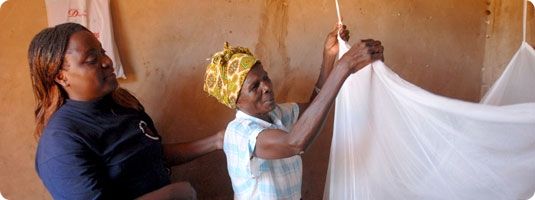Malaria No Match for Nets

Belinda and her six children live in Zambia, a country that has one of the highest incidences of malaria-related deaths in the world. The disease causes 40% of the deaths of Zambian children under five, and 20% of the deaths of pregnant women.
Belinda and her children used to suffer from malaria frequently. The children missed a great deal of school, and when Belinda was sick she couldn’t work or care for them. Her fields would go untended for weeks, resulting in less food for her family. It was a very bad situation.
But in 2008, Belinda received two long-lasting insecticide-treated nets (LLINs) from NetsforLife®, a program partnership that fights malaria in 17 sub-Saharan countries. The program uses an integrated community model for malaria prevention that includes net distribution, education, training and monitoring and evaluation. NetsforLife®’s mission is carried out and supported by Episcopal Relief & Development, Anglican and ecumenical partners, a number of corporate sponsors, and most importantly, local communities.
“NetsforLife® succeeds because it is rooted in powerful community structures,” said Meg L. DeRonghe, Acting Executive Director of NetsforLife®. “Faith leaders and networks of trained church volunteers give voice to crucial messages about malaria, hang nets for their neighbors and answer common questions or concerns. Because communities deliver the program, communities embrace it.”
Since they began sleeping under nets, which protect them from mosquitoes carrying the disease, Belinda and her children have enjoyed good health and remained malaria free. In late 2010, she was visited by NetsforLife®’s Malaria Control Agents, who checked that her nets were in place and in good condition, and gave her new nets to use when the old ones wore out. Typically, LLINs last for around three years before they need to be replaced.
Malaria Control Agents (MCAs) are integral to the NetsforLife® strategy. These are community members who receive training on how to distribute LLINs and ensure they are properly installed in homes. The agents are also responsible for helping residents learn how to prevent malaria, recognize symptoms and get treatment quickly. To date, NetsforLife® has trained 908 Zambian MCAs, who have helped the program distribute more than 897,000 nets in communities throughout the country.
Now that Belinda’s children are protected by nets when they sleep, they no longer miss school, and their improved attendance has increased their performance in class. Belinda says, “I am very grateful to the Anglican Church and NetsforLife® for the work that is being done, and I would like you to continue, as what you are doing is saving a lot of lives.”
Through its partnership with the Zambian Anglican Council, NetsforLife® is able to reach the most remote corners of the country and spread the “net culture” that is saving lives. “Net culture” is related to the level of awareness and knowledge about malaria prevention, the availability and proper use of LLINs, and the degree of community mobilization to keep everyone protected. When neighbors share experiences and success stories, they build interest, ownership and active participation in their community’s fight against malaria.
Churches of the Anglican Communion have had a long-term presence in many African communities, especially those “at the end of the road.” Local Anglican churches, such as the ones in Zambia, have tremendous organizational potential. With support from partners like Episcopal Relief & Development and NetsforLife®, they are using proven methodologies to bring huge benefits to local communities.
“We are grateful to the Anglican Church,” says Belinda. “We thought that the Church’s duty is to preach the Word of God at the pulpit on Sunday, but to our surprise the Anglican Church has come to our aid in the prevention of diseases. God bless you!”
To support the work of the NetsforLife® program partnership and get involved, visit the NetsforLife® Inspiration Fund page.


